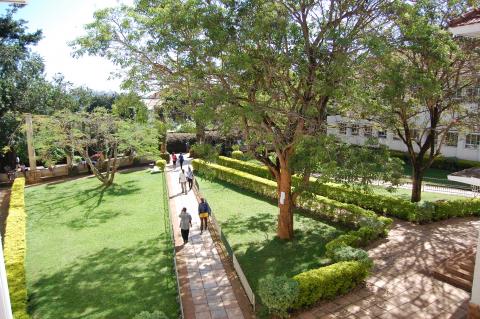Makerere University Hospital Now Reference Centre of Excellence for SMC
Submitted by admin on

It is a bright sunny afternoon on Tuesday, 11th December 2012 at the Makerere University Hospitaland a few hours away from the official launch of the Safe Male Circumcision (SMC) services by the U.S. Ambassador to Uganda H.E. Scott DeLisi. Under a semi-permanent structure at the back of the facility, a few young men and adult males are gathered and listening intently to a facilitator as she briefs them about SMC and post-surgery care. At the end of her delivery, she invites questions and is met with silence. The looks on their faces are a mixture of emotions, while the younger lot seems to still be digesting what they just heard; the older ones seem to be in awe of her boldness and candid delivery.
This is the first stage of the SMC service conducted under a newly constructed iron-roof structure, recently erected to cater for the increased demand for SMC in the Makerere community. Prior to this, the handful of participants had to make use of a tent, as the service was yet to be fully embraced by the community. However, thanks to the social marketing strategy model, where the circumcised shared their experience and referred their colleagues to the University Hospital, the numbers have swelled to over 60 surgical operations a day!
All this has been made possible thanks to the Makerere University Hospital-Makerere University Joint AIDS Programme (MJAP) partnership, funded by the U.S. President’s Emergency Plan For AIDS Relief (PEPFAR), with technical support from the U.S. Centers of Disease Control and Prevention (CDC). PEPFAR has directly supported over 450,000 circumcisions since April 2010 and increased investment in SMC in Uganda from over $1.6 million in 2009 to over $31 million in 2012.
In his address, the U.S. Ambassador graciously accepted the thanks from Makerere University, MJAP, Ministry of Health, Uganda AIDS Commission (UAC) but strongly rallied stakeholders to each play their part in the fight against the spread of HIV. “Success in saving lives depends upon all of us—ambassadors, government ministers, health care workers, students, young and old alike—playing our part and sharing in the responsibility we each shoulder,” said Ambassador DeLisi. “As President Museveni has correctly said, circumcision does not make us metal. Nor does it mean we can be sexually irresponsible with no worries about the consequences,” he added.
Mr. Cyriaco Kabagambe, The Dean of Students who represented Prof. Lillian Tibatemwa-Ekirikubinza, Deputy Vice Chancellor (Academic Affairs) at the occasion commended the U.S. Government for helping Makerere achieve a multi-pronged approach in the fight against HIV/AIDS. He further noted that thanks to this support, the University Hospital had etched its mark on the SMC service delivery in Uganda. “The program has also trained and built 15 high performance circumcision teams that are able to circumcise over 20 clients per day per team,” he said. “These teams have spread out all over the country, a feat that has transformed the hospital into a reference centre of excellence for SMC,” added Mr. Kabagambe.
Following the launch of SMC services at the University Hospital, patients are now able to get linked to other services at this facility, or at the MJAP-supported treatment site at Mulago Hospital, and elsewhere, based on their preference.
- Log in to post comments
- 11126 reads

Comments
fkakooza replied on Permalink
The great Makerere university
The great Makerere, as always and will ever be
fkakooza replied on Permalink
Way to Go
This is the way to go MAK